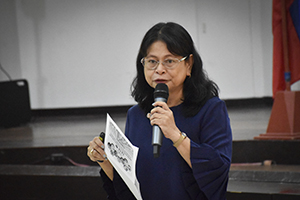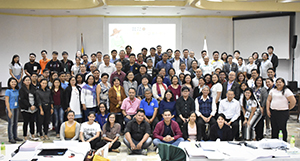 LOS BAÑOS, Laguna – Improved execution of agricultural monitoring was aimed for in the recent Smarter Approaches to Reinvigorate Agriculture as an Industry in the Philippines (SARAI) Phase 2 program review.
LOS BAÑOS, Laguna – Improved execution of agricultural monitoring was aimed for in the recent Smarter Approaches to Reinvigorate Agriculture as an Industry in the Philippines (SARAI) Phase 2 program review.
Held on January 28, 2019 at the E.O. Tan Hall of the Philippine Council for Agriculture, Aquatic, and Natural Resources of the Department of Science and Technology (DOST-PCAARRD), the Agricultural Resources Management Research Division (ARMRD) of DOST-PCAARRD conducted a program review of the ongoing SARAI Phase 2 to identify potential breakthroughs, evaluate accomplishments, and strategize for the improvement of its implementation.
According to Dr. Maria Victoria O. Espaldon, SARAI program leader, the main goal of SARAI Phase 2 is to upload, download, and share the outputs of SARAI Phase I including its ongoing Phase 2 activities. She noted its focus on refinement, field testing, and expansion of technologies developed during Phase 1 to institutionalize the integrated crop monitoring and forecasting system, and disseminate relevant crop advisories to farmers.
Accomplishments and breakthroughs of the program were highlighted through the presentations of the project leaders of the 15 projects under the program.
Representatives from SARAI’s 11 partner State Universities and Colleges (SUCs) also presented the status and accomplishments from their project sites across the country.
Dr. Antonio J. Alcantara of the Municipal Environment and Natural Resources Office (MENRO) of Los Baños; Dr. Nathaniel C. Bantayan of the University of the Philippines Los Baños (UPLB); Mr. Rodolfo O. Ilao, retired ARMRD Director of DOST-PCAARRD; and other researchers and experts from DOST-PCAARRD served as evaluators during the review.
Present also during the review were researchers and scientists of the SARAI program from UPLB, UP Diliman, and partner SUCs; staff from DOST-PCAARRD; and researchers from other involved agencies.
“We believe that SARAI is an important solution to the persistent problems in the agricultural sector,” said Dr. Melvin B. Carlos during his opening message.
The program review was also conducted in preparation for the program’s renewal.
